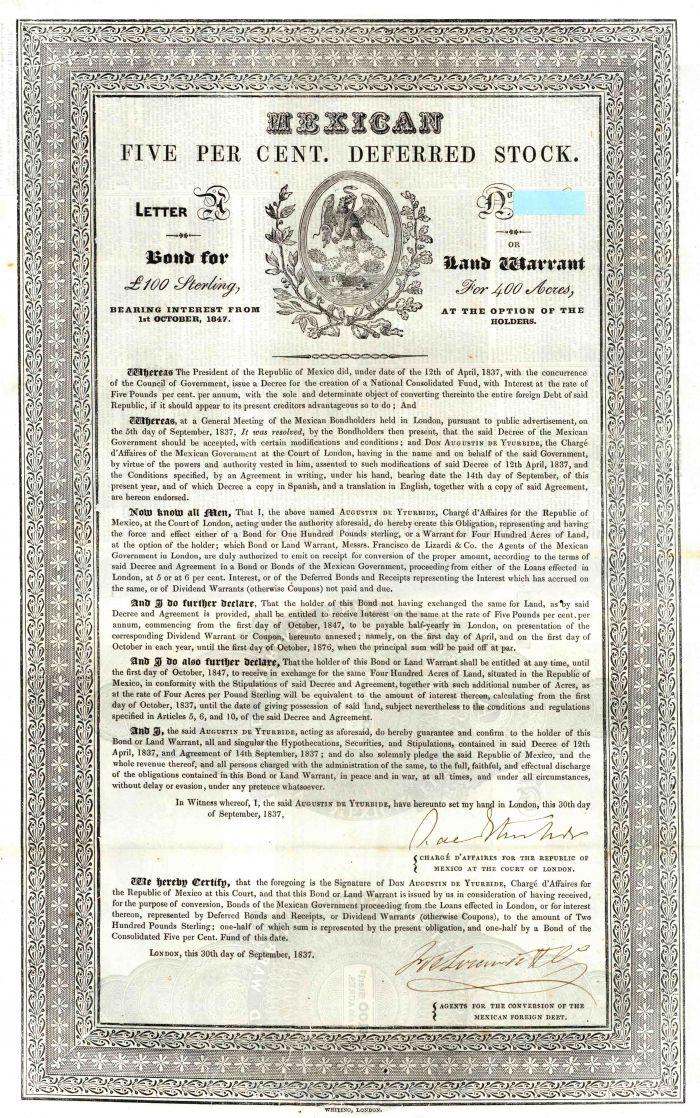Mexican Five Per Cent. Deferred Stock - 1837 £100 Bond (Uncanceled) - Mexico
Inv# FB6106 Stock
Uncanceled Bond for 100 pound Sterling bearing interest from October 1, 1847. Issued under a decree of April 12, 1837 for the conversion of Mexican Foreign Debt. Republic of Mexico. 46 more coupons which are not shown. Extremely Rare and So Early!
The first 35 years after Mexico's independence were marked by political instability and the changing of the Mexican state from a monarchy to a federated republic. There were military coups d'état, foreign invasions, ideological conflict between Conservatives and Liberals, and economic stagnation. Catholicism remained the only permitted religious faith and the Catholic Church as an institution retained its special privileges, prestige, and property, a bulwark of Conservatism. The army, another Conservative institution, also retained its privileges. Former Royal Army General Agustín de Iturbide, became regent, as newly independent Mexico sought a constitutional monarch from Europe. When no member of a European royal house desired the position, Iturbide himself was declared Emperor Agustín I. The young and weak United States was the first country to recognize Mexico's independence, sending an ambassador to the court of the emperor and sending a message to Europe via the Monroe Doctrine not to intervene in Mexico. The emperor's rule was short (1822–23) and he was overthrown by army officers.
The successful rebels established the First Mexican Republic. In 1824, a constitution of a federated republic was promulgated and former insurgent general Guadalupe Victoria became the first president of the newly born republic. Central America, including Chiapas, left the union. In 1829, former insurgent general and fierce Liberal Vicente Guerrero, a signatory of the Plan de Iguala that achieved independence, became president in a disputed election. During his short term in office, April to December 1829, he abolished slavery. As a visibly mixed-race man of modest origins, Guerrero was seen by white political elites as an interloper. His Conservative vice president, former Royalist General Anastasio Bustamante, led a coup against him and Guerrero was judicially murdered. There was constant strife between Liberals, supporters of a federal form of decentralized government and often called Federalists and their political rivals, the Conservatives, who proposed a hierarchical form of government, were termed Centralists.
Mexico's ability to maintain its independence and establish a viable government was in question. Spain attempted to reconquer its former colony during the 1820s, but eventually recognized its independence. France attempted to recoup losses it claimed for its citizens during Mexico's unrest and blockaded the Gulf Coast during the so-called Pastry War of 1838–39. Santa Anna lost a leg in combat during this conflict, which he used for political purposes. Emerging as a national hero in defending Mexico was creole army general, Antonio López de Santa Anna, who had participated in the overthrow of the emperor, fought the Spanish invasion, and came to dominate the politics for the next 25 years, until his own overthrow in 1855.
Mexico also contended with indigenous groups which controlled territory that Mexico claimed in the north. The Comanche controlled a huge territory in the sparsely populated region of central and northern Texas. Wanting to stabilize and develop the frontier, the Mexican government encouraged Anglo-American immigration into present-day Texas. The region bordered the United States, and was territory controlled by Comanches. There were few settlers from central Mexico moving to this remote and hostile territory. Mexico by law was a Catholic country; the Anglo Americans were primarily Protestant English speakers from the southern United States. Some brought their black slaves, which after 1829 was contrary to Mexican law. Santa Anna sought to centralize government rule, suspending the constitution and promulgating the Seven Laws, which place power in his hands. When he suspended the 1824 Constitution, civil war spread across the country. Three new governments declared independence: the Republic of Texas, the Republic of the Rio Grande and the Republic of Yucatán.
The largest blow to Mexico was the U.S. invasion of Mexico in 1846 in the Mexican–American War. Mexico lost much of its sparsely populated northern territory, sealed in the 1848 Treaty of Guadalupe Hidalgo. Despite that disastrous loss, Conservative Santa Anna returned to the presidency yet again and then was ousted and exiled in the Liberal Revolution of Ayutla.
A stock certificate is issued by businesses, usually companies. A stock is part of the permanent finance of a business. Normally, they are never repaid, and the investor can recover his/her money only by selling to another investor. Most stocks, or also called shares, earn dividends, at the business's discretion, depending on how well it has traded. A stockholder or shareholder is a part-owner of the business that issued the stock certificates.











Ebay ID: labarre_galleries